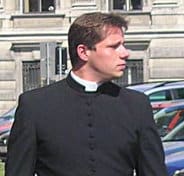RECONCILIATION
Dear Father John, During the sacrament of reconciliation, they say that the priest is “in persona Christi”, meaning, if I understand correctly, that it is really Christ that is acting through him. If so, how come the priest cannot understand if I say my sins in my own language that he doesn’t know? Surely Christ knows every language, since prayers are translated.
Thank you for your interesting and astute question. God’s action through the sacraments is, without a doubt, mysterious. That means we can never understand it fully. But a couple observations may help give some clarity to the specific issue you raise.
What In Persona Christi Really Means
 Yes, the validly ordained priest acts in persona Christi when he celebrates the sacraments. That phrase is Latin for “in the person of Christ.” The full theological phrase is actually in persona Christi Capitis, which translates “in the person of Christ the head” – meaning the head of the Church. Let’s begin by simply recalling what the Catechism explains about the meaning of this reality, and then we can attempt to answer your question:
Yes, the validly ordained priest acts in persona Christi when he celebrates the sacraments. That phrase is Latin for “in the person of Christ.” The full theological phrase is actually in persona Christi Capitis, which translates “in the person of Christ the head” – meaning the head of the Church. Let’s begin by simply recalling what the Catechism explains about the meaning of this reality, and then we can attempt to answer your question:
In the ecclesial service of the ordained minister, it is Christ himself who is present to his Church as Head of his Body, Shepherd of his flock, high priest of the redemptive sacrifice, Teacher of Truth. This is what the Church means by saying that the priest, by virtue of the sacrament of Holy Orders, acts in persona Christi Capitis… Through the ordained ministry, especially that of bishops and priests, the presence of Christ as head of the Church is made visible in the midst of the community of believers… (Catechism of the Catholic Church (CCC), paragraphs 1548, 1549)
In other words, through ordination a priest is united to Christ in a special way so that all the Catholic faithful can be guaranteed objective access to God’s grace through the priest’s ministry. In a sense, God chooses to continue the mystery of the Incarnation through the sacrament of the priesthood. By the incarnation of the second person of the Holy Trinity, God ministered to the world inside time and space, by means of Christ’s human nature. Jesus continues that ministry now through the human nature of the priest. In this choice, God shows that he yearns to meet us where we are, to enter into a real relationship with us, to redeem our human nature through his grace, not to get rid of or substitute for that human nature. He respects the human nature that he has given us, and reaches out to us through the continual mediation of that human nature, including the human nature of ordained ministers.
Priests vs. Zombies
And yet, God doesn’t take over the human nature of the priest. He doesn’t possess it in such a way that the priest’s own personality and consciousness are suspended. If he did, then the priest would simply be a kind of robot or zombie, an inanimate channel of God’s grace rather than a true partner of Christ and a conscious, free sharer in Christ’s mission. God doesn’t work that way. He doesn’t override our human nature. Instead, he calls and chooses every Christian to enter into a relationship with him, and those who accept the call become partners in God’s work of salvation. The New Testament calls this, among other things, becoming “co-workers in the truth” (3 John 1:8). God refuses to violate our freedom, but works through us, and in a sacramental way through his priests, respecting our freedom. This manifests his love and respect for us, as well as our dignity from being created in his image. The Catechism explains this in terms of the priest’s human weakness, which isn’t obliterated by the sacrament of Holy Orders:
This presence of Christ in the minister is not to be understood as if the latter were preserved from all human weaknesses, the spirit of domination, error, even sin. The power of the Holy Spirit does not guarantee all acts of ministers in the same way. While this guarantee extends to the sacraments, so that even the minister’s sin cannot impede the fruit of grace, in many other acts the minister leaves human traces that are not always signs of fidelity to the Gospel and consequently can harm the apostolic fruitfulness of the Church. (CCC 1550)
The Priest’s Role in Confession
 Now we are ready to answer your question. In the sacrament of reconciliation, God’s grace reaches us through the priest no matter what, as long as the matter and form of the sacrament are respected, regardless of the wisdom, attention, or comprehension of the priest. Of course, the more responsibly a priest engages in this ministry, the more helpful will be his mediation. His advice and his manner can contribute to or detract from the penitent’s experience of God in the sacrament, but they don’t increase or decrease the sacramental grace itself. And so, even if you confess to a priest who doesn’t know your language, as long as you can understand the penance that he gives you the sacrament is still valid. Christ’s grace reaches you through the priest who is acting in persona Christi. But Christ’s grace doesn’t override the priest’s human nature and limitations (like language), rather it works mysteriously through them.
Now we are ready to answer your question. In the sacrament of reconciliation, God’s grace reaches us through the priest no matter what, as long as the matter and form of the sacrament are respected, regardless of the wisdom, attention, or comprehension of the priest. Of course, the more responsibly a priest engages in this ministry, the more helpful will be his mediation. His advice and his manner can contribute to or detract from the penitent’s experience of God in the sacrament, but they don’t increase or decrease the sacramental grace itself. And so, even if you confess to a priest who doesn’t know your language, as long as you can understand the penance that he gives you the sacrament is still valid. Christ’s grace reaches you through the priest who is acting in persona Christi. But Christ’s grace doesn’t override the priest’s human nature and limitations (like language), rather it works mysteriously through them.
I hope this helps answer your question, at least a little bit. God bless you!
+
Art for this post on reconciliation: Mirror detail of Clerical Clothing, KF, 11 September 2005; Interior Scene [Confession], Jean Alphonse Roehn (1799-1864), unknown date; both PD-Worldwide, Wikimedia Commons.


